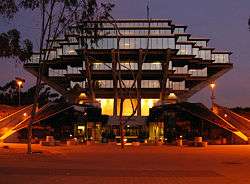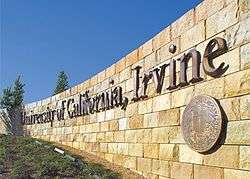California Institute for Telecommunications and Information Technology
 | |
| Parent institution |
UC San Diego Jacobs School of Engineering UC Irvine Donald Bren School of Information and Computer Sciences |
|---|---|
| Established | November 5, 2005 |
| Focus | nanoscience, wireless communications, supercomputing |
| Head |
Larry Smarr Ramesh Rao (UCSD) G. P. Li (UCI) Ronald Graham (Chief scientist) |
| Location | La Jolla, San Diego & Irvine, California |
| Website | http://www.calit2.net/ |
The California Institute for Telecommunications and Information Technology (Calit2, previously Cal(IT)2), also referred to as the Qualcomm Institute at its San Diego branch, is a $400 million academic research institution jointly run by the University of California, San Diego (UCSD) and the University of California, Irvine (UCI).[1] Calit2 was established in 2000 as one of the four UC Gray Davis Institutes for Science and Innovation.[2] As a multidisciplinary research institution, it is conducting research discovering new ways in which emerging technologies can improve the state's economy and citizens' quality of life. Keeping in mind its goal of addressing large-scale societal issues, Calit2 extends beyond education and research by also focusing on the development and deployment of prototype infrastructure for testing new solutions in real world environments. Calit2 also provides an academic research environment in which students can work alongside industry professionals to take part in conducting research and prototyping and testing new technologies.
Since 2008, Calit2 has implemented its strategic plan, Path Forward. The plan is based on the four core enabling technologies of wireless telecommunications, phototonics, nanotechnology and micro-electro-mechanicals systems (MEMS), and cyber space in order to digitally transform applications in culture, health, energy, and the environment.[3] Partnering with companies such as Broadcom, Cisco Systems, Hitachi, and Google Earth, Calit2 has collaborated with more than 250 industry names on sponsored research, technology licensing, and spinoffs based on Calit2 inventions.[3] The State of California provided a $100 million grant to Calit2 to support the design and construction of both campus buildings and facilities. Calit2 also receives support from other funding agencies such as the National Science Foundation, National Institutes of Health, CalTrans, and the UC Discovery Program.[3]
People
Calit2 is home to scientific, artistic, and technological innovators. Leadership is divided into four main groups: Directors, Divisional Councils, Governing Board, and the Advisory Board. Notable and distinguished members of the advisory board include:[3]
- Anne Petersen (Research Professor, University of Michigan, Center for Human Growth and Development, Founder and President, Global Philanthropy Alliance)
- Phil Smith (Executive Director, National Research Council)
- Mark Anderson (Chief Executive Officer, Strategic News Service)
- Vinton G. Cerf (Vice President and Chief Internet Evangelist, Google)
- Robert W Conn (President, The Kavli Foundation)
- Deborah Estrin (Professor of Computer Science & Director of Center for Embedded Network Systems, University of California, Los Angeles)
- Raouf Y. Halim (Chief Executive Officer, Mindspeed Technologies, Inc.)
- Roberto Padovani (Executive Vice President and Chief Technology Officer, QUALCOMM)
- Duane Roth (Chief Executive Officer, CONNECT)
- Stanton Rowe (Corporate Vice President for Advanced Technology, Edwards Lifesciences)
- David Schramm (President and Chief Executive Officer, Maxwell Technologies)
- Drew Senyei (Managing Director, Enterprise Partners)
- Kathi Vian (Director Ten Year Forecast, Institute for the Future)
- Andrew Viterbi (President, The Viterbi Group, Professor Emeritus, University of California, San Diego)
- Warren Washington (Senior Scientist, National Center for Atmospheric Research)
- Telle Whitney (President and CEO, Anita Borg Institute)
Buildings
Calit2 currently has two buildings, one located at UC San Diego, and another at UC Irvine. The two Calit2 facilities have unique capabilities such as clean rooms, MEMS labs, immersive virtual reality facilities, and a digital cinema theater. Another important feature of these buildings is its shared laboratory space that is both flexible and reconfigurable as the space can be reassigned or rearranged when new projects emerge.
UCSD Building

The full name of the UCSD division of Calit2 is the "Qualcomm Institute for Telecommunications and Information Technology, the UC San Diego Division of Calit2".[4] Atkinson Hall is the home of the Qualcomm Institute. The 215,000-square-foot facility was designed by NBBJ and constructed by Gilbane and is "inspired by the notion of change and the coexistence of opposites".[5] This building was designed as an instrument of research to encourage partners to combine in unusual teams to make fundamental discoveries.[3] Atkinson Hall's interior encourages open communication and collaboration between colleagues through its open and reconfigurable design. This building features the state-of-the-art StarCAVE virtual-reality environment. The StarCAVE is a pentagon-shaped, 3D, virtual reality (VR) room where the audience and viewer are surrounded by 360-degree projections over 15 screens covering the walls and two screens on the floor [6] Another important feature Atkinson Hall provides to its visitors and researchers is its extreme bandwidth. Atkinson Hall contains about 2 million feet of category 6 copper cabeling with 150 optical fibers connecting the building to UCSD's network.[3]
UCI Building

The Calit2 building at the University of California, Irvine is currently a 120,000-square-foot building designed by Johnson Fain Partners and constructed by PCL Construction Services.[7] Aside from its research labs, offices, support space, meeting space, and four-story atrium, the Calit2 building at UCI also houses a 3,700 square-foot Nanofabrication Cleanroom Facility.[7] This room offers a filtered-air environment, large-scale visualization lab, network lab, and also labs for optical devices, nanotechnology and media arts. The Calit2 building features a spacious and state-of-the-art auditorium that can seat an audience of around 145 people.[7] The UCI facility also has access to UCI's first Voice-over-IP phone system and statewide/nationwide high-speed fiber optic networks.[3] The UCI Calit2 building is the home of TechPortal, a business technology incubator offering 1460 square feet of space for up to eight companies.[8] TechPortal provides affordable space, access to facilities/services, and expert mentoring to UCI-based startup companies.[8] Also, with the help of the U.S. Geological Survey, this building also contains 40 seismic sensors that measure ground and building motion.[7]
Research
Calit2 conducts notable research projects in the following areas:[3]
- Digitally Enabled Genomic Medicine
- Education
- Environment & Civil Infrastructure
- Intelligent Transportation
- Interfaces & Software
- Materials & Devices
- Network Infrastructure
- New Media Arts
- Policy & Society
One notable project is Project GreenLight, in which research was dedicated in finding a way to build a functional green compute facility.[9] Calit2 is also known for its project, Community Cyberinfrastructure for Advanced Marine Microbial Ecology Research and Analysis (CAMERA), which was created to address the challenges the microbial ecology research community faced in metagenomic analysis.[10] Currently, CAMERA aims to create a rich, distinctive data repository and a bioinformatics tools to support the growing amount of data on metagenomic data.
Awards
Since 2009, Calit2 has been awarded several funded research grants by NIH and NIF. Along with research grants, Calit2 was honored the Innovations in Networking Award for High-Performance Research Applications by the Coroporation for Education Network Initiatives in California (CENIC) from 2007-2012.[11] This annual award is given out annually to "highlight exemplary innovations that leverage ultra high-bandwidth networking, particularly where those innovations have the potential to revolutionize the ways in which instruction and research are conducted, or where they further the deployment of broadband in underserved areas." [11] Calit2's most recent project honored by CENIC was its Mexican-American advanced network project to increase bandwidth and network communication between research facilities in Mexico and America.[11] The other past projects recognized by CENIC have included the CineGrid consortium, the Scalable, Energy Efficient Datacenters (SEED) project, and the GreenLight project.[11]
Gallery at Calit2
The Gallery at Calit2 has presented numerous exhibitions from artists around the world since 2009 including Jordan Crandall, Carlos Trilnick, Felipe Zuñiga, Nina Waisman, Ignacio Lopez, Adriene Jenik, Antoinette LaFarge, Robert Allen, Greg Niemeyer and Sabrina Raaf. Guest curators include Christiane Paul and Steve Dietz.
The Gallery has hosted talks by artists including Ann Hamilton, Jordan Crandall, Micha Cárdenas, Amy Sara Carroll, Sharon Daniel, Warren Sack and Rita Raley.
See also
- MIT Media Lab - A similar entity on the East Coast
References
| Wikimedia Commons has media related to California Institute for Telecommunications and Information Technology. |
- ↑ The New York Times. Markoff, John. November 5, 2005. "Researchers Look to Create a Synthesis of Art and Science for the 21st Century" .
- ↑ "Governor Gray Davis for Science and Innovation." Office of the President. May 22, 2008.
- 1 2 3 4 5 6 7 8 "California Institute for Telecommunications and Information Technology." www.Calit2.net Retrieved 2012-4-20.
- ↑ Potter, Matt (14 November 2013). "How Qualcomm got a UCSD institute named after itself". San Diego Reader. Retrieved 27 February 2015.
- ↑ "Richard C. Atkinson Hall." Facilities Link. Retrieved 2012-4-20. .
- ↑ Ramsey, Doug. "3D Virtual Reality Environment Developed at UC San Diego Helps Scientists Innovate." UC San Diego News Room Retrieved 2012-4-20.
- 1 2 3 4 "Calit2 University of California, Irvine" Calit2.uci.edu Retrieved 2012-4-20
- 1 2 "UCI to debut technology business incubator at Calit2." UCIrvine Today. Retrieved 2012-4-20.
- ↑ "GreenLight UCSD." http://greenlight.calit2.net/ Retrieved 2012-4-20. .
- ↑ "Community Cyberinfrastructure for Advanced Marine Microbial Ecology Research and Analysis." http://camera.calit2.net/ Retrieved 2012-4-20. .
- 1 2 3 4 "For Fifth Year in a Row, Calit2 Honored with CENIC 2012 Innovations in Networking Award." UC San Diego News Center Retrieved 2012-4-20.
Coordinates: 32°52′58″N 117°14′04″W / 32.882679°N 117.234545°W

